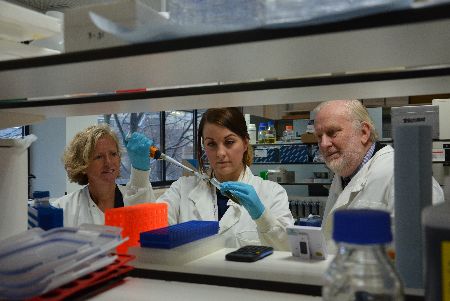MP for Ellesmere Port and Neston, Andrew Miller, swapped legislation for a lab coat, to find out more about the cancer research being carried out at the University of Liverpool.
He was invited to the North West Cancer Research (NWCR) Centre by Centre Director, Professor Sarah Coupland, who recently spent a week in Westminster to find out more about how science policy is formed.
The visit was part of a unique ‘pairing scheme’ run by The Royal Society – the UK’s national academy of science – which aims to build bridges between parliamentarians and some of the best scientists in the UK. It is an opportunity for parliamentarians and civil servants to become better informed about science issues and for scientists to understand how they can influence science policy.
During the visit Mr Miller met some of the researchers based at the NWCR Centre and on the University campus to discuss how their work fits in with wider cancer strategies in the region. He also made a presentation to the researchers about how they as scientists can help to influence government policy.
Rapidly changing world
Mr Miller said: “Keeping up with the rapidly changing world is challenging, no more so than in areas of scientific research. As part of this pairing scheme, Professor Coupland and I aim to have a better idea of how our respective worlds work, and more importantly for me to improve my ability to advocate the case for science investment in important areas like this.”
Cancer is the biggest killer in Liverpool. In 2011, about 1,300 people died from cancer and cancer- related illnesses. The number of new cancer cases in Liverpool is higher than the rest of England. People in this region are more than 20% more likely to be diagnosed with cancer than anywhere else in the UK, and this gap continues to widen.
Despite these figures, Liverpool is leading the way when it comes to cancer research and a wide range of basic and clinical research projects are currently underway at the NWCR Centre. Professor Coupland hopes to be able to build upon this world-class research and address the magnitude of the city’s cancer problem, through an increased understanding between researchers and policy makers.
Influencing policy
Professor Coupland said: “Understanding the political landscape is vital if we are to continue to make significant inroads into cancer research. As scientists, we need to understand how our research affects the bigger picture when it comes to cancer strategies and policies.
“It is equally important for policy makers to understand how our research is helping to progress the development of new treatments and therapeutic targets.
“I can now share what I have learned with my fellow researchers at the North West Cancer Research Centre, and use this to enable a better understanding between our two very different worlds.”
He was invited to the North West Cancer Research (NWCR) Centre by Centre Director, Professor Sarah Coupland, who recently spent a week in Westminster to find out more about how science policy is formed.
The visit was part of a unique ‘pairing scheme’ run by The Royal Society – the UK’s national academy of science – which aims to build bridges between parliamentarians and some of the best scientists in the UK. It is an opportunity for parliamentarians and civil servants to become better informed about science issues and for scientists to understand how they can influence science policy.
During the visit Mr Miller met some of the researchers based at the NWCR Centre and on the University campus to discuss how their work fits in with wider cancer strategies in the region. He also made a presentation to the researchers about how they as scientists can help to influence government policy.
Rapidly changing world
Mr Miller said: “Keeping up with the rapidly changing world is challenging, no more so than in areas of scientific research. As part of this pairing scheme, Professor Coupland and I aim to have a better idea of how our respective worlds work, and more importantly for me to improve my ability to advocate the case for science investment in important areas like this.”
Cancer is the biggest killer in Liverpool. In 2011, about 1,300 people died from cancer and cancer- related illnesses. The number of new cancer cases in Liverpool is higher than the rest of England. People in this region are more than 20% more likely to be diagnosed with cancer than anywhere else in the UK, and this gap continues to widen.
Despite these figures, Liverpool is leading the way when it comes to cancer research and a wide range of basic and clinical research projects are currently underway at the NWCR Centre. Professor Coupland hopes to be able to build upon this world-class research and address the magnitude of the city’s cancer problem, through an increased understanding between researchers and policy makers.
Influencing policy
Professor Coupland said: “Understanding the political landscape is vital if we are to continue to make significant inroads into cancer research. As scientists, we need to understand how our research affects the bigger picture when it comes to cancer strategies and policies.
“It is equally important for policy makers to understand how our research is helping to progress the development of new treatments and therapeutic targets.
“I can now share what I have learned with my fellow researchers at the North West Cancer Research Centre, and use this to enable a better understanding between our two very different worlds.”


